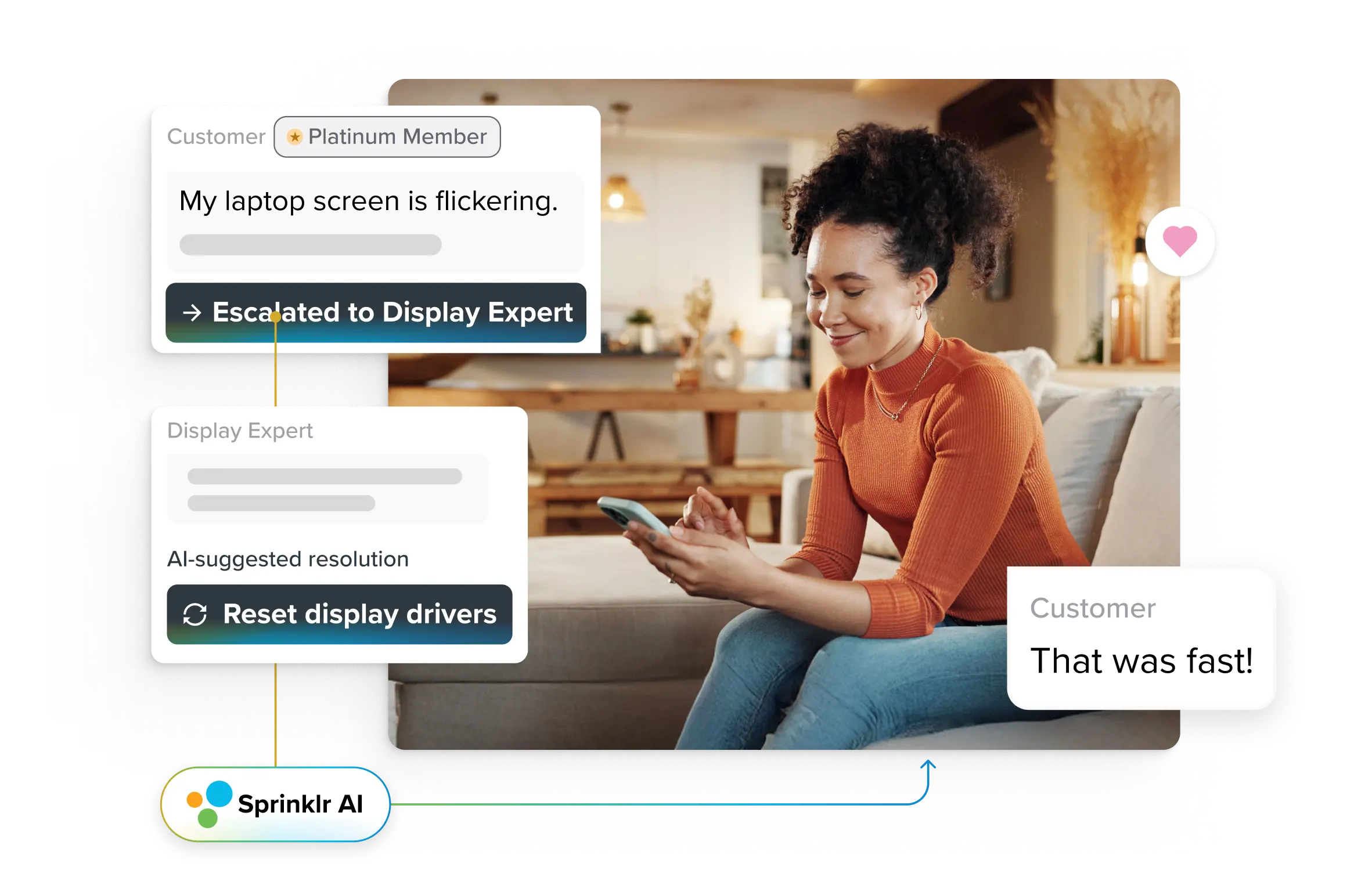Transform CX with AI at the core of every interaction
Unify fragmented interactions across 30+ voice, social and digital channels with an AI-native customer experience platform. Deliver consistent, extraordinary brand experiences at scale.

Why is Accountability in Customer Service Important?
Have you ever reached out to customer service, only to be bounced around between agents without getting your problem solved?
Frustrating, isn’t it? This kind of experience points to a major gap: a lack of accountability in customer service. When service teams don’t take ownership, customers feel ignored, trust erodes and the brand's reputation takes a hit.
In B2B, companies with high customer satisfaction are 1.5 times more likely to outpace their competitors. Accountability plays a huge role in this success, extending beyond just resolving individual issues.
This blog explores what accountability in customer service means, why it matters and how to build a team dedicated to providing a positive customer experience.
What is customer service accountability?
Customer service accountability means taking personal responsibility for actions, decisions and outcomes while resolving customer issues. It is a core element of building trust and lasting customer relationships. When team members own their roles, it helps resolve issues effectively and reinforces customer loyalty.
Picture this: A customer orders a medium-sized jacket online but receives an extra-large instead. Frustrated, they call the brand’s customer service, feeling let down. An attentive contact center agent listens carefully, immediately acknowledges the mistake and apologizes sincerely. They arrange an expedited replacement, ensuring it arrives within two days and follow up with a detailed email that includes tracking info and a personalized note expressing genuine regret for the error. By owning the issue from start to finish, the agent turns a disappointing experience into a moment of restored trust.
Related Read📚: 11 Warm Ways to Show Gratitude to Your Customers
Importance of customer service accountability
Customer frustration arises primarily due to a lack of accountability. Modern customers want proactive service from businesses and expect quick and effective resolutions. Building a culture of accountability and commitment to delivering superior customer experience can benefit businesses in many ways:
1. Enhances customer satisfaction
Accountability is at the core of satisfying customers. When a customer reports a technical glitch in a newly installed app, an accountable service representative takes charge. They actively coordinate with the technical team, follow up diligently, and ensure the problem gets resolved promptly.
About 53% of consumers say that a company's experience matters as much as its products or services. Putting accountability into practice means making the customer feel prioritized and supported, showing that their issue matters just as much to the company as it does to them.
2. Drives customer retention and loyalty
When customers know their issues will be resolved without hassle, they feel valued, which leads to stronger loyalty. In fact, 82% of them are more likely to stick with your brand if they receive value during service interactions.
An e-commerce company can build a vast base of loyal customers by quickly redressing issues and maintaining a standard 24-hour timeline for any replacement. This also helps expand its customer base, as loyal customers are more likely to recommend your brand and services to others.
3. Enables long-term success
Accountability in customer service fosters both better processes and lasting success. When teams own their mistakes, they actively learn from them, making meaningful adjustments that improve service quality.
For example, if an airline provides timely updates, offers swift rebooking, and follows up after a delay, it demonstrates real accountability. This approach not only keeps customers satisfied but strengthens trust, making them more likely to choose the airline again. By addressing problems head-on, accountability helps build long-term loyalty and a stronger brand reputation.
Must Read📚: Customer retention strategies to use in 2024
How can customer service teams build a culture of accountability?
Building a culture of accountability in customer service takes commitment and a clear strategy. Here’s how customer service teams can effectively embed accountability into their daily practices:
1. Set clear expectations from the start
Accountability begins with clarity. Ensure that every team member knows exactly what’s expected of them, from handling customer issues to meeting response times. Define roles, responsibilities and performance benchmarks clearly.
Best practice ✅: Create a simple onboarding manual or regular sessions on customer service training that outline roles, key metrics and the impact of each position on the customer experience.
What to avoid ❌: Don’t assume that employees know what’s expected of them. Failing to set clear goals can lead to confusion, inconsistency and lack of accountability.
2. Lead by example and take ownership
When leaders own their actions, it sets the tone for everyone else. It shows the team that accountability isn’t just expected — it’s lived. When leaders keep their promises, admit mistakes and make things right, they encourage others to do the same.
Best practice ✅: Be clear and transparent about challenges, decisions and expectations. Honest communication builds trust and helps the team feel included in problem-solving. It also makes change easier to manage in contact centers.
What to avoid ❌: Don’t wait for a crisis to occur. Address issues as they arise and guide your team through them. Proactive leadership prevents small problems from turning into bigger ones.
3. Encourage open communication
Accountability thrives in a culture where team members feel safe to speak up, share ideas and learn from their errors. Open dialogue, timely feedback and a focus on solutions help employees own their roles and improve over time.
Best practice ✅: Provide specific, constructive feedback and encourage employees to suggest solutions for their mistakes. Support them in implementing these solutions to boost accountability and confidence.
What to avoid ❌: Avoid focusing solely on weaknesses or fixing mistakes for employees. Instead, involve them in problem-solving, making accountability a shared responsibility.
Pro Tip 🎯: Use a Workforce Engagement Management (WEM) solution to boost accountability. A strong tool uses AI to deliver real-time feedback, track progress and let agents manage their schedules. This empowers agents to own their performance, feel recognized and stay engaged — creating a more accountable and motivated team.

Check out how you can actively engage, coach and enhance accountability in your customer service team.👇
4. Reward and recognize accountability
Appreciating employees for taking ownership drives a culture of accountability. When team members receive genuine recognition—whether through verbal praise, incentives, or formal awards — they’re more likely to repeat positive behaviors. It shows that accountability is noticed and valued.
Best practice ✅: Celebrate accountability publicly. During team meetings, call out specific instances where an employee took the initiative to resolve an issue or deliver results. This not only boosts morale but also sets an example for others.
What to avoid ❌: Don’t overlook anyone’s efforts. Ignoring accomplishments can create resentment and perceptions of favoritism. Recognize dedication at all levels to ensure everyone feels valued and motivated to be accountable.
5 tips to improve customer service accountability
When working as a team, everyone should be accountable for their role, the potential outcomes and their impact on the customer experience. Here are five practical tips to strengthen accountability and enhance your customer service experience.
1. Designate clear roles
Assign specific roles within the team, such as project lead, task owner or reviewer. This ensures that everyone knows who’s responsible for each part of a project or service request. When roles are well-defined, it’s easier to track progress and resolve issues quickly. This clarity prevents tasks from falling through the cracks, making accountability a shared responsibility among team members.
2. Embed accountability in daily workflows
Make accountability a natural part of daily workflows by fostering a change in mindset. Encourage agents to use customer empathy, adaptability and proactive communication when handling customer issues.
Actively listen to customers, adapt to their needs and provide regular updates to build trust.
Use clear workflows that detail each step, supported by automated reminders for deadlines and follow-ups. This makes accountability consistent, not just a guideline but a part of daily actions.
Pro tip💡: Use AI-driven tools to enhance guided workflows. AI can predict customer needs, offer real-time suggestions and identify the quickest resolution paths. This boosts agents’ ability to respond efficiently while maintaining accountability. Integrate shared document hubs to give agents instant access to resources, policies and project files, making their work smoother.
With Sprinklr’s Guided Workflows, you can:
✅ Use AI intent analysis to guide agents toward the right solutions.
✅ Automate workflows for consistent service across channels.
✅ Provide agents with real-time recommendations for faster issue handling.

Unpack this with us today with a demo.
3. Establish a peer review system
Introduce a peer review system where agents can give each other feedback on handling customer interactions. This not only fosters learning but also builds a culture where accountability is seen as a team effort. Encourage honest, constructive feedback, focused on growth and support. Peer reviews allow agents to learn from each other’s successes and mistakes, boosting confidence and ownership.
4. Implement performance scorecards
Use scorecards to track individual and team accountability metrics, like response times and customer feedback. Share these scorecards regularly with agents to maintain transparency. Keep the scorecards simple, focusing on a few key metrics that reflect service quality. Regular reviews create a clear path for personal growth and team success.
💡Pro tip 📊: Assess agent performance with automated scoring. With an advanced quality management platform, you can track daily conversations across 30+ quality and compliance parameters, like active listening, empathy and response quality. Automated scoring ensures fair, consistent evaluations, and AI-backed reasoning behind scores to make feedback more transparent and actionable.

5. Sharpen supervisor visibility
Supervisors need a precise, targeted view of team performance to maintain accountability. Real-time insights help spot trends, track agent productivity and identify areas needing immediate attention. This focused visibility allows supervisors to guide and upskill agents more effectively and instill a sense of ownership.
Pro tip 📊: Use real-time analytics to optimize your customer service. Use a unified supervisor dashboard to get automated, AI-generated alerts on critical KPIs like potential escalations, CSAT drops and increasing backlogs. View real-time status, assignments and agent performance metrics across queues, enabling precise corrective action. Use the dashboard to communicate directly with agents — share urgent updates, files, and crisis guidelines.

See it, own it, fix it — check out how supervisor visibility drives team accountability with a demo!
Final thoughts
Accountability is at the heart of great customer service. It helps shape smarter business strategies and keeps customers happy. From clear communication to using analytics and real-time feedback, every step counts. When you bring these together, you build a culture where agents take ownership and customers feel heard.
An AI-first customer service solution like Sprinklr Service helps you and your team stay informed with unified insights and any deviations that can crinkle the quality of your service experiences.
Frequently Asked Questions
General service responsibilities involve executing routine tasks and duties to address customer queries and provide feedback. On the other hand, customer service accountability involves going the extra mile to take ownership of actions, decisions and outcomes.
Customer service accountability can be measured through customer surveys, resolution rates and the tracking of repeat complaints. Metrics like net promoter score (NPS) and CSAT can give better insights.
Organizations should encourage open communication and feedback sharing, avoid creating a blame-focused environment, emphasize learning from mistakes, recognize team efforts and promote collaboration to find solutions.
Customer feedback and insights help validate accountability efforts, identify service gaps and show improvement directions. They provide actionable data for teams to address issues promptly and proactively and maintain high service standards.
Businesses can communicate the importance of customer service accountability by reviewing customer feedback, setting clear goals and consistently reinforcing accountability through leadership and corporate strategies.









